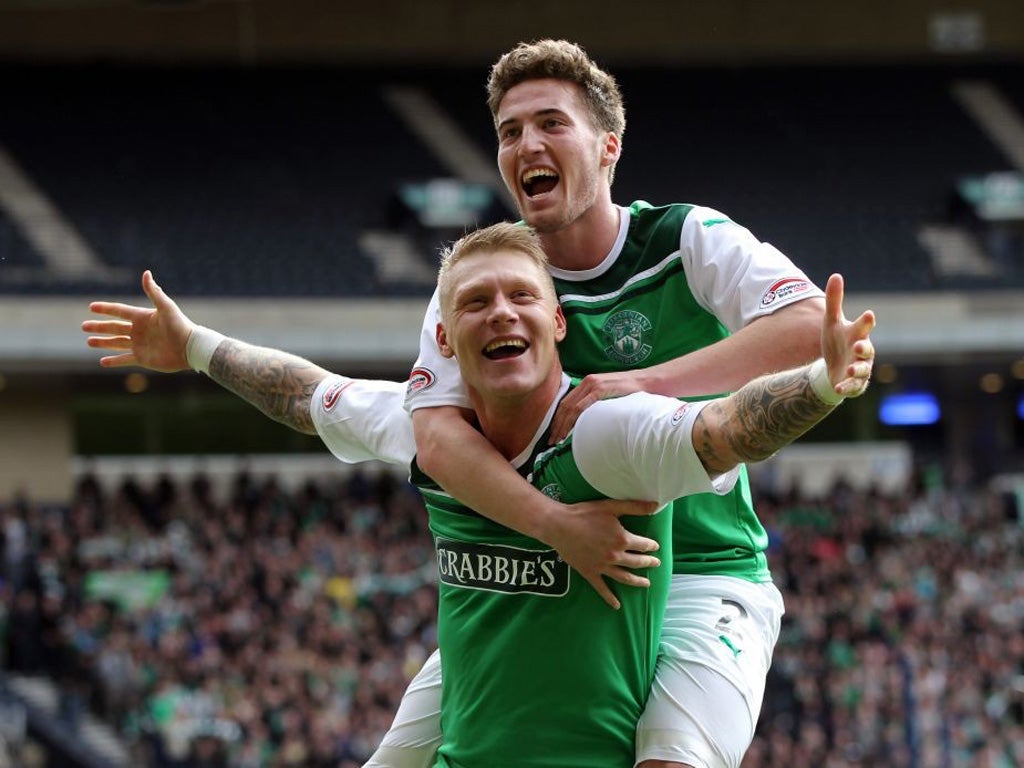Hibernian hope to end 110 years of pain in all-Edinburgh final
One of football's oldest rivalries comes out for once from under the shadow of the Old Firm

Your support helps us to tell the story
From reproductive rights to climate change to Big Tech, The Independent is on the ground when the story is developing. Whether it's investigating the financials of Elon Musk's pro-Trump PAC or producing our latest documentary, 'The A Word', which shines a light on the American women fighting for reproductive rights, we know how important it is to parse out the facts from the messaging.
At such a critical moment in US history, we need reporters on the ground. Your donation allows us to keep sending journalists to speak to both sides of the story.
The Independent is trusted by Americans across the entire political spectrum. And unlike many other quality news outlets, we choose not to lock Americans out of our reporting and analysis with paywalls. We believe quality journalism should be available to everyone, paid for by those who can afford it.
Your support makes all the difference.The fastest a car could travel was 69 miles per hour and Real Madrid had just been founded: the year was 1902, the last time Hibernian won the Scottish Cup. Since then it has become the Edinburgh club's bogey trophy: they have reached nine finals since but lost every one of them. Today, they have the chance to end 110 years of pain by beating their bitter city rivals Hearts in the first all-Edinburgh Scottish Cup final for more than a century.
Yet for most of Britain – with Chelsea taking on Bayern Munich in the Champions League, Leinster playing Ulster in rugby union's Heineken Cup and Blackpool and West Ham competing for a spot in next season's Premier League – it is likely to be the day's forgotten final.
Like every other team in Scotland, both Edinburgh clubs are constantly overshadowed by the Old Firm of Rangers and Celtic, and the same goes for their rivalry. First contested on Christmas Day 1875, it is one of football's oldest and most intense derbies, but earns few headlines south of the border.
Now for a disclaimer: I am a Hibs fan, and will be among the 20,000 or so supporters in the green end of Hampden Park today hoping for a miracle. I remember the misery of our last Scottish Cup final in 2001 (comprehensively losing 3-0 to Celtic on a sweltering day in May) but also the joy of witnessing the Hibees lift the League Cup in 2007 (our first trophy for 16 years).
Hearts, known affectionately as the "Jam Tarts" or "Jambos", go into the game as clear favourites – they have had a relatively successful season and won both derby games in the league. Hibs are obvious underdogs. The club has had one of its worst seasons in recent memory: poor performances and a disappointing manager (now sacked) meant relegation was only narrowly avoided. But this is just one game.
Like most local rivalries, the animosity between the two clubs is rooted in their respective histories.
Hibernian were founded in 1875 by Irish immigrants, Hearts a year earlier by members of a dancehall on the city's Royal Mile, from which they also took their distinctive full name, Heart of Midlothian.
In the 1870s, Hibernian (derived from Hibernia, the Roman name for Ireland) were mainly supported by poorer Irish immigrants; Hearts were seen as the "establishment" Edinburgh team. Yet unlike Rangers and Celtic, whose rivalry was and continues to be dominated by religious differences, supporters of Hibs and Hearts are divided more by geography. Hibs fans tend to come from the north and east of the capital, Hearts fans from the south and west.
That said, a religious element promoted by a minority of supporters can still be seen at derby matches. Sectarian chants are rare, but unfortunately not unheard of. Union Flags will occasionally be flown in the Hearts end, matched by Irish republic flags in the Hibs end.
Lee McLennan, president of Edinburgh and Livingston Hibs Supporters' Club, admits that the comparisons exist. "Hearts get called the mini-Rangers, we get called the mini-Celtic," he says. "Hearts are more a British team, we're more an Irish team." But he is quick to point out that for the vast majority of fans, the rivalry is "all about the football".
"In Glasgow, it's about stuff without a basis in football," he says. "But my best mate's a Jambo, my other half's a Jambo; it's about banter – after the game we all have a drink together."
Davy Allan, head of the London Hearts Supporters' Club, agrees that the lack of a hardcore sectarian element is the main thing which separates Hibs and Hearts from Rangers and Celtic.
"I've got friends and family that are Hibs fans, which you probably wouldn't see in an Old Firm context," he says. "I'm old enough to remember standing together [with Hibs fans] on the terraces at Tynecastle. The rivalry's probably more intense among the younger fans who don't remember those days."
Most sports fans probably won't choose to watch the Scottish Cup final today – but they'll be missing something special. The tackles will be nasty, the football will certainly not be pretty. It'll probably rain. Both sets of fans will spend most of the 90 minutes feeling sick (I know I will).
But what's 90 minutes when you've waited 110 years?
Chris Green is deputy news editor of The Independent
Join our commenting forum
Join thought-provoking conversations, follow other Independent readers and see their replies
Comments